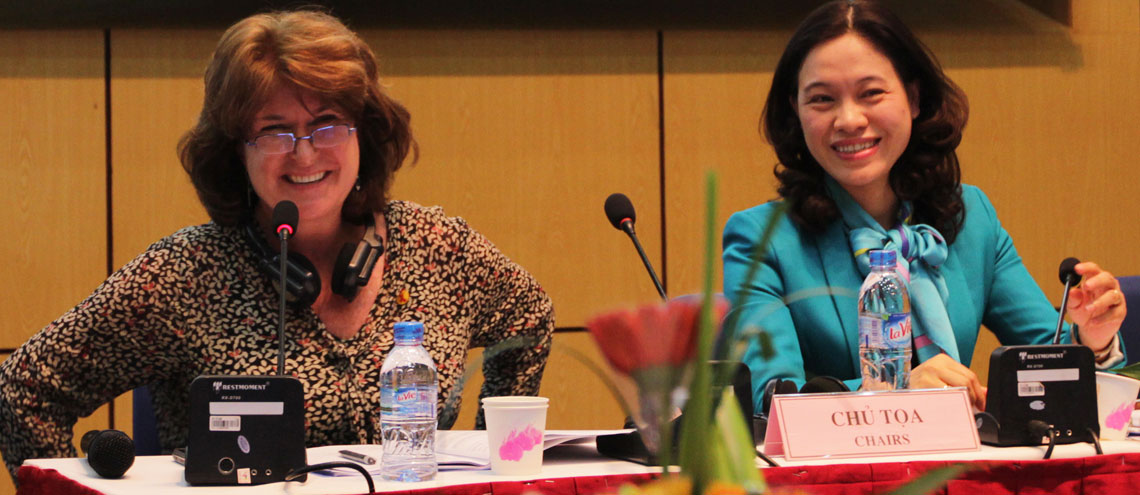Consultation Workshop to validate scientific and legal evidence in support of the request for invalidation of Patent VN9900
Professor Pham Manh Hung, Chairperson of the Ha Noi AIDS Association and the Viet Nam Medical Association;
Distinguished participants from government, civil society and the private sector:
One of the major roles of UN organizations is to help UN Member States adhere to the UN conventions and declarations that are agreed at global level. The 1948 Universal Declaration on Human Rights includes the right to health, and this right is described in the International Covenant on Economic, Social and Cultural Rights as the “right of everyone to the enjoyment of the highest attainable standard of health”. In order for a person to achieve the highest attainable standard of health, he or she must have access to affordable healthcare, including affordable medicines.
Today we are here to consider the issue of affordable medicines for people living with HIV in Viet Nam – in particular, access to antiretroviral medicines, or ARVs. When I first started working on HIV more than 20 years ago, a diagnosis of HIV infection was the same as telling a person that he or she had a few months, or maybe a few years to live. AIDS was a death sentence. But now, ARVs allow people living with HIV to live long, healthy and productive lives. People living with HIV MUST have affordable access to ARVs, or they will die. That much is clear.
The more complicated issue is how. These medicines are not free. Somebody needs to make them, and somebody needs to pay for them. Multi-national pharmaceutical companies have spent billions of dollars for the research and development of the first ARVs and the newest and most effective regimens available. They warn us that they need to recoup these costs. If they can’t, then they cannot develop new drugs to fight HIV and other diseases. Just like any other intellectual property, drug companies are granted patents for these medicines that give them exclusive rights to manufacture and sell them for many years. But after patents expire, other companies can make these medicines, and this competition dramatically drives down costs.
Since about a decade ago, as generic drug manufacturers began large-scale production of ARVs, the price for one year of treatment has decreased from over US$10,000 per person in 2000 to less than US$116 in 2010. This big drop in price has coincided with a massive increase in the number of people living with HIV on treatment in Viet Nam and in other low- and middle-income countries, and a tremendous decrease in the annual number of AIDS-related deaths. It is clear that the international community and individual countries must strike a balance between the need to respect the intellectual property rights of private-sector companies and the need to respect individuals’ right to health.
This balance is reflected in international trade rules. Countries within the World Trade Organization must give a minimum of 20 years of patent protection to the inventors of new technologies. But these rules have flexibilities that allow countries to ensure access to technological innovations if it is in the greater social interest – for example, to improve public health. Individual countries also have discretion regarding the decision on what is a genuine innovation that deserves a patent, and what is only a small change to an existing product that does not deserve a patent.
Today we are gathered together to consider a specific case – a patent for an antiretroviral medicine that the Viet Nam Network of People Living With HIV would like to challenge. I would like to congratulate VNP+ for having the courage to make such a request, which is very much in line with their role as the national voice for people living with HIV. I would also like to congratulate the Hanoi AIDS Association for supporting VNP+ to explore this potential patent challenge. And I would like to thank all of you for taking the time to consider this case.
UNAIDS is proud to support this consultation workshop. Our role is not to provide advice regarding the legal or technical merits of this particular case. Our role is to facilitate the dialog, with the aim of ensuring that people living with HIV in Viet Nam can claim their right to the highest attainable standard of health.
I would like to end by stressing that we are considering more than just people living with HIV and access to affordable ARVs. In the backs of our minds we must also be thinking about people in Viet Nam who suffer from other diseases, such as hepatitis, heart disease, cancer and diabetes. It is important for both government and civil society to clearly understand all the options available to ensure that all Vietnamese can afford the medicines they need to claim their right to health. Workshops on intellectual property often get bogged down in legal and technical details, and maybe that is unavoidable because the laws and the medicines are very complex. But in the end, we are not talking about drugs or patents, we’re talking about people, and how the rules on intellectual property and trade can be used to ensure that people can live happy, healthy and productive lives.
I look forward to the presentations from the three experts, and a vigorous discussion on these important issues.
Xin cam on va chuc suc khoe! (Thank you very much, and I wish you good health).




